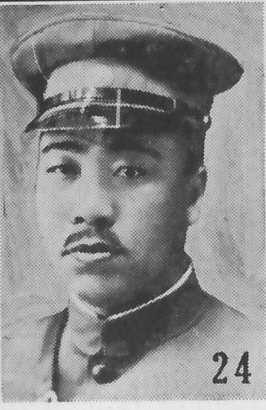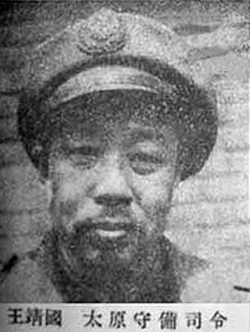Wang Jingguo on:
[Wikipedia]
[Google]
[Amazon]

 Wang Jingguo (, 18 July 1893 – presumed dead April 1949) was a
Wang Jingguo (, 18 July 1893 – presumed dead April 1949) was a

 Wang Jingguo (, 18 July 1893 – presumed dead April 1949) was a
Wang Jingguo (, 18 July 1893 – presumed dead April 1949) was a Kuomintang
The Kuomintang (KMT) is a major political party in the Republic of China (Taiwan). It was the one party state, sole ruling party of the country Republic of China (1912-1949), during its rule from 1927 to 1949 in Mainland China until Retreat ...
general from Shanxi
Shanxi; Chinese postal romanization, formerly romanised as Shansi is a Provinces of China, province in North China. Its capital and largest city of the province is Taiyuan, while its next most populated prefecture-level cities are Changzhi a ...
. He was the son-in-law of the warlord who controlled Shanxi from 1911–1949, Yan Xishan
Yan Xishan (; 8 October 1883 – 22 July 1960; also romanized as Yen Hsi-shan) was a Chinese warlord who served in the government of the Republic of China from June 1949 to March 1950 as its last premier in mainland China and first premi ...
. Wang served throughout his career in Yan's army, fighting in numerous campaigns.
Military service
Suiyuan
In 1936 units under Wang's command were sent to reinforce theInner Mongolia
Inner Mongolia, officially the Inner Mongolia Autonomous Region, is an Autonomous regions of China, autonomous region of China. Its border includes two-thirds of the length of China's China–Mongolia border, border with the country of Mongolia. ...
n province of Suiyuan
Suiyuan () was a historical province of China. Suiyuan's capital was Guisui (now Hohhot). The abbreviation was (pinyin: ). The area Suiyuan covered is approximated today by the prefecture-level cities of Hohhot, Baotou, Wuhai, Ordos, Bayan ...
, which Yan controlled. Wang's orders were to defend against an attack by the Japanese puppet army of Mengguguo, led by Demchugdongrub
Demchugdongrub (8 February 1902 – 23 May 1966), also known as Prince De ( zh, 德王), courtesy name Xixian ( zh, 希賢), was a Qing dynasty Chinese Mongol prince descended from the Borjigin imperial clan who lived during the 20th century and ...
. Wang's senior commander in defending Suiyuan was Fu Zuoyi
Fu Zuoyi () (June 2, 1895 − April 19, 1974) was a Chinese military leader. He began his military career in the service of Yan Xishan, and he was widely praised for his defense of Suiyuan from the Japanese. During the final stages of the Chine ...
, who was also an officer of Yan's. In the subsequent battle with Mengguguo, Demchugdongrub's forces were virtually annihilated, and he lost all areas in Suiyuan and Chahar which were not under the immediate protection of the Japanese Kwantung Army
The Kwantung Army (Japanese language, Japanese: 関東軍, ''Kantō-gun'') was a Armies of the Imperial Japanese Army, general army of the Imperial Japanese Army from 1919 to 1945.
The Kwantung Army was formed in 1906 as a security force for th ...
.
Second Sino-Japanese War
When the Japanese invaded Shanxi in 1937, Yan Xishan requested, and received, military aid from the CommunistPeople's Liberation Army
The People's Liberation Army (PLA) is the military of the Chinese Communist Party (CCP) and the People's Republic of China (PRC). It consists of four Military branch, services—People's Liberation Army Ground Force, Ground Force, People's ...
, which entered Shanxi and set up operations in much of the province. By late 1938 Yan had become afraid of the rapid power and influence that the Communist forces operating in Shanxi quickly gained, and this fear caused Yan to become increasingly hostile to Communist agents and soldiers. In order to combat the spread and influence of communism within Yan's armies and in the area that Yan controlled, Wang Jingguo persuaded Yan to establish a "National Revolutionary Comrades Association", a paramilitary organization that existed to identify and persecute Communists in Yan's territory and in the army. The actions of this Association eventually contributed to the destruction of all cooperation between Yan and the Communists in the winter of 1939. From 1939-1945 Yan was successful in keeping his territory free from Communist influence and activity.
Chinese Civil War
By 1948 all Nationalist forces in China, including Yan Xishan's forces, were being rapidly defeated by Chinese Communist armies. In March 1948 Yan himself was airlifted out ofTaiyuan
Taiyuan; Mandarin pronunciation: (Jin Chinese, Taiyuan Jin: /tʰai˦˥ ye˩˩/) is the capital of Shanxi, China. Taiyuan is the political, economic, cultural and international exchange center of Shanxi Province. It is an industrial base foc ...
, taking most of the provincial treasury with him, apparently for the purpose of asking the central government to send more supplies and materiel to Yan's surrounded forces. Yan did not return. Wang Jingguo was left in charge of much of Yan's remaining forces, including all Nationalist reinforcements left stranded in Taiyuan. Wang's direct superior was a Japanese officer who had joined Yan's army after World War II, Imamura Hosaku
Imamura Hōsaku (Japanese: 今村方策, January 4, 1900 – April 24, 1949) was a Japanese military officer in the Kwantung Army who was most notable for staying on in China after the surrender of Japan on August 15, 1945. He and many of his fello ...
, who continued to direct the resistance. In April, 1949, the Communists launched a final attack against Taiyuan's last defenders that included over 1,300 pieces of artillery and a force three times larger than the defenders. After Taiyuan fell, Wang Jingguo was captured. He was last seen in public being led through the streets at the end of a rope.Gillin 288
Footnotes
References
* Gillin, Donald G. ''Warlord: Yen Hsi-shan in Shansi Province 1911-1949''. Princeton, New Jersey: Princeton University Press. 1967. {{DEFAULTSORT:Wang Jingguo 1893 births 1952 deaths National Revolutionary Army generals from Shanxi People from Xinzhou Chinese anti-communists